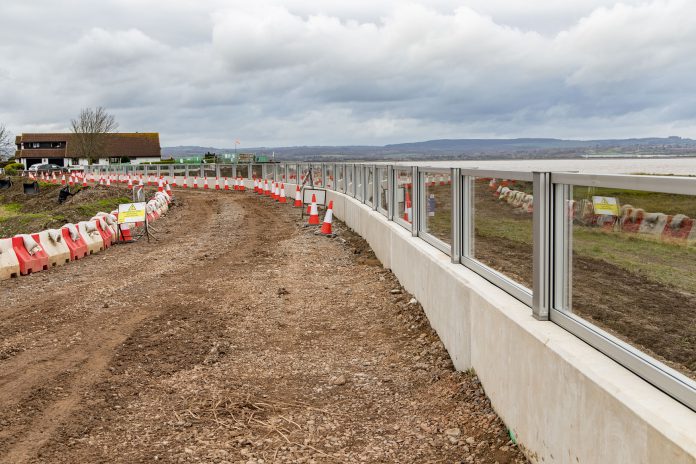The Avonmouth and Severnside Enterprise Area (ASEA) Ecological Mitigation and Flood Defence project has achieved another milestone this month with an innovative hybrid glass flood defence at New Passage, South Gloucestershire. The glass panels, on a concrete base, were installed at New Passage because of its location as a popular viewpoint and birdwatching spot on the Severn Way footpath.
You can watch a short video of the panels’ installation here https://www.youtube.com/watch?v=WibRNORCHOM
The panels mean that residents and visitors will still be able to enjoy the breath-taking views of the Severn Estuary, while providing robust flood defence for years to come. Manufactured off-site, they were delivered directly to New Passage, minimising disruption to the public. Each panel has been fitted individually so that, if one were to be damaged, it could be repaired or replaced quickly without disrupting the rest of the flood defence.
The glass panels are one of the innovative flood defence techniques being used along the project’s 17km stretch of coastline. Construction of earth embankments, sheet piling, flood walls and gates continues along the line of flood defences. The project is a partnership between South Gloucestershire Council, Bristol City Council, and the Environment Agency.
Colin Taylor, Senior Flood & Coastal Risk Management Advisor at the Environment Agency, said: “This section of flood defence is the result of long-term consultation and dialogue with the local community. The plans have evolved extensively to create a hybrid form of flood defence with a concrete base and glass panel installed above. Not only will this help significantly reduce flood risk to the community here at New Passage from flooding in the years ahead, but it will also preserve the stunning views of the Severn Estuary.”
Cllr Toby Savage, Leader of South Gloucestershire Council and Cabinet Member with responsibility for Climate Change, said: “It is fantastic to see these glass panel flood defences installed at New Passage. Their innovative design was in direct response to feedback received from the community. This is a clear marker of the progress that we are making to help protect the Avonmouth and Severnside area from flooding for decades to come.”
Cllr Nicola Beech, Cabinet lead for Climate, Ecology and Waste, Bristol City Council, said: “The completion of this part of the flood defence project is a great milestone for such an ambitious project, as well as a showcase of one of the innovative solutions that will better protect residents and businesses from flooding in the future, while preserving views of a landscape that is being improved to provide a better home for internationally significant species of bird, such as curlew and shelduck.”
The largest of its kind in the region, the £80m project will provide 17km of new and improved flood defences, from Lamplighter’s Marsh in the south to Aust in the north, once complete in 2026/27. The defences will help reduce flood risk to the area from the increased risk of flooding from climate change and rising sea levels, reducing flood risk to around 2,500 homes and businesses over the scheme’s lifetime. It will also create a minimum of 80 hectares (the equivalent of around 112 football pitches) of new wetland habitats for the internationally important Severn Estuary’s bird species.
The project will boost the regional and national economy by enabling development within the 1,800 hectare Avonmouth and Severnside Enterprise Area, helping to unlock 12,000 new jobs by 2026.
Funding for the project has come from the West of England Local Enterprise Partnership, administered by the West of England Combined Authority. Other funding sources are the Government’s Flood Defence Grant in Aid, and Local Levy raised by the Wessex Regional Flood and Coastal Committee. The contractor is BMMjv (https://www.asea-flood-ecology.co.uk/bmmjv-explained/).









